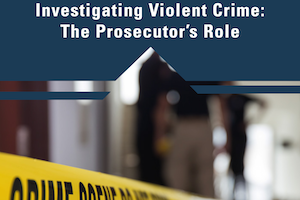National Human Trafficking Prosecution Best Practices Guide

Human trafficking is the second most profitable criminal industry behind the drug trade, estimated by the International Labor Organization to be a $150 billion industry worldwide. To better equip prosecutors to address this devastating crime, the National District Attorneys Association’s Women Prosecutors Section developed a National Human Trafficking Prosecution Best Practices Guide. The guide provides an overview of sex trafficking and labor trafficking, various state and federal trafficking laws, working with victims, the investigative process, and more. Read
Read More



